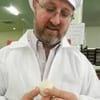Mycoplasma synoviae; the last piece in the puzzle
Excellent article.I agree that MS is progressively aggressive mainly in organic or free range layer flocks
Vaccination with MSlive is the only way to reduce spreading in multi stage farm.
Have a look at my similar articles on www.bioproperties.com.au or researchgate
Dear Chris,
As per my view world wide Mycoplasma is controlled by 3 way
1.Through MG/MS free breeding stock
2.Through vaccination
3. Through Medication
But If we see the nature of avian mycoplasma is very stringent due to lack of cell wall, its nature of living intracellular in the body and once infected infection remains for life. That's the reason its make unique than other pathogens.
So as per my view vaccination of MG/MS is not so effective because to have the good efficacy of vaccine, its should produce more antibody's inside the body after administration but the Mycoplasma is intracellular and works on cellular immunity and not on the humoral immunity so the less amount of Ag-Ab production and poor is the protection.
Secondly , the strain differentiation with the vaccine as well as field strain. There is question mark about the vaccination in the infected flock may be vertically or horizontally shall we recommend in that flock?
In this context its suggestive of control through medication like macrolide and pluromutilin group of antibiotics as they are only having the capacity to treat intracellularly as compared to other class of antibiotics. As since so long there is no resistance problem has been registered till date and no interference of these molecules to human food chain.
This is my practical experience abut the mycoplasma in our part of country.
.jpg&w=3840&q=75)

Candidate Genes Associated with Survival Following Highly Pathogenic Avian Influenza Infection in Chickens
I have been to India quite a bit lately and control also includes combinations of live and killed vaccines, biosecurity and antibiotics. The availability of mycoplasma free replacement stock is also a new innovation and requires a complete rethink of mycoplasma control in India.
I also saw a lot of flocks still having mycoplasma problems despite being treated regularly with antibiotics even with Tiamulin. Breeders are being targeted hard as antibiotic controls from international fast food chains are being implemented at the broiler level. Certainly throughout the whole of Asia fluroquinolone resistance in mycoplasmas is a fact of life. Tylosin resistance is present in some places like Indonesia.
Antibiotics and live vaccines (including F strain) are incompatible. All the live vaccines are sensitive to all antimycoplasmal antibiotics. Interestingly no strains of MS are sensitive to erythromycin. They are all inately resistant.
At the moment there is a lot of focus on leg problems in males especially in the males of the new broiler breeder strains in cages. I am not even sure this is caused by MS. Could be just having a heavier bird on wire.
Anyhow Asia needs to wean itself off antibiotics in lay as this is potentially the greatest driver of resistance and will cost human lives in the future. Not resistance in the mycoplasma which the antibiotics is targetting but in non-target organisms (mainly in the get). Co-selection for plasmids carrying mutl-resistance factors including resistance to heat, desiccation, disinfectants, heavy metals means we need to think about more than just reducing antibiotic use. It is scary. The only thing more scary is the water contamination around Hyderabad's antibiotic factories.
We need to do more than monitor resistance development to protect our safe future.
see
http://www.bioproperties.com.au/!Pages/Publications/Documents/DOC-MycoplasmaControl-CentralToAntibioticStewardship.pdf


Hangzhou DE Mark Industrial Co Ltd

I entirely agree with the discussion above. I in Uganda where am a practitioner and a farmer I have encountered this and what saved me mainly was taking biosecurity as number one control measure. Right now I get very few episodes of the disease on my layer farm of 25,000 layers.
I have just introduced the live vaccine of Mycoplasma, in an effort to control the infection properly. This has worked for me and the enterprises are becoming economically viable.


Evonik Animal Nutrition
Early Respiratory Distress Complex.
Veterinarians are at the forefront of the emerging knowledge economy in Nigeria. Our ability to organize veterinary knowledge into Veterinary information and data to solve industry problems is the VALUE.
Respiratory infections in domestic animals are a major issue for veterinary and livestock industry. Pathogens in the respiratory tract share their habitat with a myriad of commensal microorganisms. The understanding of the role of the host and the environment in is key in understanding of respiratory disease etiology and how best to prevent and control ERDC.





















